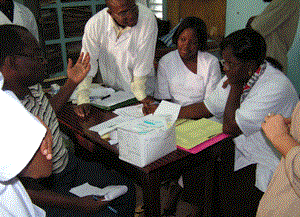
Early results from a clinical drug trial of a new four-month treatment for tuberculosis (TB) indicate that it is well tolerated, but overall could not be considered as an alternative to current six-month standard treatment. The study – one of the first in 35 years – was presented at the 44th Union World Conference on Lung Health in Paris on 3 November by researchers from the London School of Hygiene & Tropical Medicine on behalf of the Gatifloxacin for TB team.
The study was designed to verify if the new, shorter (four-month) treatment including gatifloxacin could be considered as “non inferior” (no worse than) the standard six-month treatment. Researchers could not prove this, though the difference in effectiveness between the two treatments varied considerably across the different countries where the study took place. The new treatment was also found to have similar effectiveness to the standard treatment among undernourished patients and people living with HIV, but it was less effective among other groups. The researchers are now investigating further to understand the reasons for these results.
The study enrolled over 1,800 patients in five African countries (Benin, Guinea Conakry, Kenya, Senegal and South Africa). Half of the patients received the standard six-month treatment; the other half received the shortened four-month treatment with gatifloxacin replacing one of the drugs of the standard treatment.
TB remains a significant public health problem worldwide. There were an estimated 8.6 million people who developed TB and 1.3 million died from the disease in 2012. The standard treatment is very effective if taken for the full six months, but in reality, many do not do this. Stopping treatment before completion may result in TB becoming drug resistant and thus potentially fatal, as well as able to be transmitted to others.
The trial was co-sponsored by the Special Programme for Research and Training in Tropical Diseases (TDR) and the Institut de Recherche pour le Développement (IRD). The study was funded by TDR and the European Commission. TDR is a co-sponsored programme based at the World Health Organization, and co-sponsored by UNICEF, UNDP, the World Bank and WHO.
A unique feature of this trial is the collaboration between the two sponsors, three national African TB programmes (Benin, Guinea Conakry and Senegal), two African research institutes (Kenyan Medical Research Institute and Medical Research Council of South Africa) and four European institutions: Assistance Publique – Hôpitaux de Paris, St Georges Hospital Medical School, the Institute of Tropical Medicine in Antwerp, and the London School of Hygiene and Tropical Medicine.
Full findings from the study will be published in a peer-reviewed journal in the coming months.